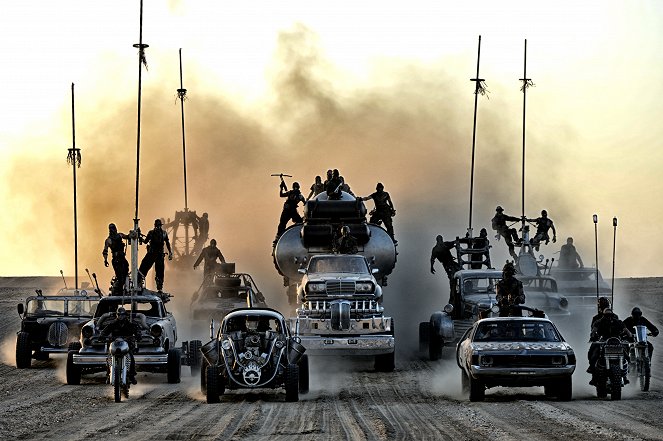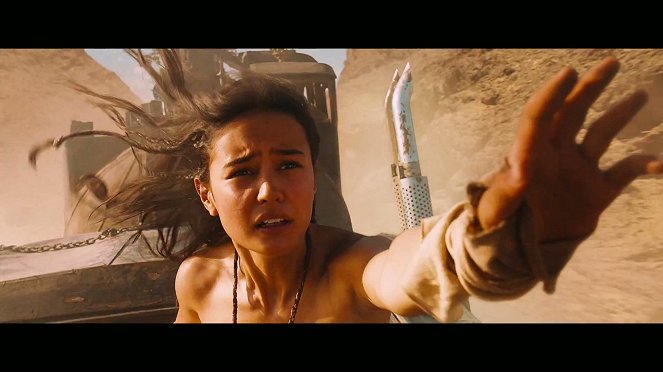Directed by:
George MillerCinematography:
John SealeComposer:
Tom HolkenborgCast:
Tom Hardy, Charlize Theron, Nicholas Hoult, Hugh Keays-Byrne, Rosie Huntington-Whiteley, Zoë Kravitz, Riley Keough, Josh Helman, Nathan Jones, Megan Gale (more)VOD (5)
Plots(1)
Haunted by his turbulent past, Max (Tom Hardy) wanders alone until he’s swept up with a group, led by Imperator Furiosa (Charlize Theron), fleeing across the Wasteland. In hot pursuit: a warlord who gathers his gang and pursues the rebels ruthlessly, leading to a high-octane road war in director George Miller’s return to the world of Mad Max. (Warner Bros. UK)
(more)Videos (19)
Reviews (18)
I have not seen such a crazy movie in a while. It almost looks as if George Miller shot his craziest dream the way he’s seen it and lived through it. Nobody talked into it, nobody interfered with it and he just did it exactly the way he wanted. You can feel the madness, helplessness and despair of the post-apocalyptic world even two thousand light years far from you. When it comes to acting, Tom Hardy, Nicholas Hoult and Charlize Theron are a sure bet. Nevertheless, some moments in the movie were so crazy that I was not able to process them and the only thing I was left with after those scenes was a bewildered face which still could not comprehend what it had seen. However, one thing is for certain. I have not seen such a well-filmed action, where digital effects fade in comparison to the real action ride, in a long time. If I even saw anything like that in this millennium. Hard to say. I think I didn’t.
()
With characters defined by their looks, makeup and costumes, Fury Road is a super cool, non-stop action ride with amazing drive that pretends to have some sort of plot. The experienced George Miller has adapted the trends of contemporary blockbusters (a deafening audiovisual aspect that’s more important than the storyline) into a distinct vision of a post-apocalyptic world (with which perhaps someone else can find an emotional connection?), fitting it with dozens of clever details that are insignificant for the story, but turn the movie as a whole (together with the over-the top drive I’ve already mentioned) into a unique film entertainment product. The close-up of a head rising from the sand is the shot of the year.
()
Every year I see dozens of films in the cinema and many more at home, and only some of the new ones leave me with the feeling that I've watched something special; something that will be talked about in ten years. Fortunately, Mad Max: Fury Road is one of those. The trailers didn't bullshit, this is a brutal action ride from start to finish. When George Miller said his film was going to be one big chase, he wasn't lying. Even more interesting than the action itself, however, which is exquisite, thrilling and visually original, is what surrounds it. The director of Happy Feet has managed to make a new Mad Max that must satisfy fans of the trilogy and newcomers alike. Fury Road is an almost physically uncomfortable film. Whereas other post-apocalyptic films usually have clearly defined good and evil, here there is only madness, and thanks to some of the characters (Nicholas Hoult gets a career-best role) it's almost palpable. It's a cruel world with bizarre rules, fascinating and repulsive at the same time. Good doesn't exist, evil doesn't exist either, all that's left is a fierce fight for survival. And you will be right in the middle of it. Mad Max grabs you at the beginning, then thrills you, disgusts you, horrifies you and fascinates you all the time. And by the end of it, you'll feel like you've seen something special. Not just entertaining or interesting, but truly exceptional.
()
Thirty years is a long time, and George Miller has left the original Mad Max far behind. Not only is Mel Gibson surprisingly sorely missed, given that Tom Hardy's hesitant grumbling moments simply don't work at all, but Fury Road draws on the worst of the echoes of the original trilogy. Namely, the usual bizarreness, flatness of characters, and the fact that it's mostly just about one city and its fate. The fact that this time it's done in a grandiose way through to the last shot results in an audiovisual delight led by a breathtaking motorcycle raid, but without at least one truly interesting character, it's a massacre that simply doesn't mean anything to me outside the basic action layer.
()
It may sound like the grumbling of an old man, but they just don’t make films like this anymore, and that is the key reason for the deserved unanimous enthusiasm that accompanies Fury Road. Against the background of today’s technology, the new Mad Max is a film from an era that has long since passed – in terms of style, it comes across as the essence of 1980s Australian trash flicks laid out in the form of an epic fresco following the example of the peak of Hollywood’s creative era of the 1970s. Fury Road is simply Miller’s Apocalypse Now or Heaven’s Gate. In the promotional campaign, the constantly emphasised appellation “visionary director” was for once not a hollow phrase, but an appropriate statement, in every sense of the word. Miller reveals himself to be not only a filmmaker with a well-though-out vision, from which he builds a portrait of a distinctive post-apocalyptic world thought out to the smallest detail, but also a filmmaker who has yielded completely to his own delirious vision, which is both absorbing and fascinating. Though Fury Road is both a variation on the original trilogy and its continuation, it thus remains fundamentally distinctive and unique. So, even though fans will identify various similarities between the new film and the trilogy, Fury Road never engages in that current pop-culture scourge, quotespotting. There is no recycling, no knowing winks at fans, no references to other films or pop culture, and not even any franchise elements. Fury Road is not exclusive and elitist like contemporary blockbusters, which create enclaves of true believers by flattering different audience segments. Into the artificial and overly sophisticated waters of the contemporary mainstream, Miller has released his own raging monster, which, with the roar of an infernal machine, cuts a path through all of the rules about the habits of the target audience, commercial trends and the producer’s calculations, and it has no regard at all for what a contemporary blockbuster is supposed to look like or what supposedly works in it and why. Like its world, the film is simultaneously disjointed and deranged, yet in spite of that, it is also completely coherent and functional. The archetypal three-act narrative concept is crushed here by a single permanent confrontation and non-stop tension (the first shot, in which the characters are not in motion or in immediate danger and are only talking to each other, seems as if it is from another world). Out of the bowels of the degenerate macho action-movie genre, a matriarchal parable has grown, with the male characters surprisingly relegated to supporting roles. And all of this is set in a pulsating world, which we don’t see from the outside, but are rather thrown into. As the characters carry us along at a frenetic pace, we see, unwittingly and literally at the edge of the field of vision, that world’s practical functioning and, primarily, its complex mystique, which emerged from omnipresent madness and pain. In an interview, Miller said that he liked the feeling he had when, as a child, he walked out of the cinema and felt like he had stepped off a roller coaster and wanted to get right back on it. Whereas the seasonal blockbusters of recent years have merely zipped passed viewers, leaving only a dim memory on the horizon, Fury Road picks up viewers at full speed and, like its protagonist, runs them paralysed and strapped to the hood through the tumult of its creator’s vision. If the post-apocalypse previously infused archetypal heroic stories with new blood and replaced the foul taste of the distant era of westerns and chivalric tales with the intoxicating promise that the age of heroes would come again in the future with the fall of civilisation, then Fury Road likewise revives the validity of the mythological epic in the destruction of the world. Though the film’s narrative has certain similarities to The Iliad and The Odyssey, its matriarchal level refers to even more ancient traditions. Even though it evidently undermines machismo and the patriarchy, it also offers a celebration of heroism and masculinity in accordance with the aforementioned revitalisation of archetypes. The appearance of those traits here, however, is not only classical in nature, but also mythically absolute and post-feministically complex in equal measure. When the roar of the engines subsides and the smoke from the explosions clears, we see the tragic and paradoxical nature of the heroism of not only Max, but primarily of the other main character, who, infatuated with the myth of patriarchy, rushed like a raging dog of war to the gates of Valhalla, but only achieved true heroism when he abandoned the father figure and accepted the role of helper and protector alongside his mother. Fury Road takes a no less complex approach to women, who, in the manner of legendary matriarchal societies, not only personify life and procreative and regenerative power, but also serve as warriors. However, they are not limited to the one-dimensional ideal of badass goddesses of war. Like the male characters, each of them has her own story and motivations, which are alluded to in the narrative, and those are what condition their heroism, which is all the more impressive thanks to its believability and inspirational nature.
()
(less)
(more)
Gallery (189)
Photo © Warner Bros. Pictures / Jasin Boland



Ads